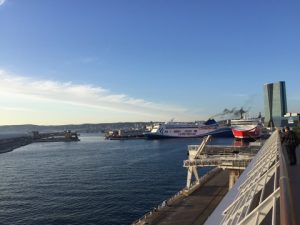Despite a dip in oil volumes, first-half cargo throughput at Marseille Fos rose 2% on January-June last year at 39.9 million tonnes, driven by growth in all three general cargo sectors – containers, ro-ro and conventional traffic. Meanwhile passenger activity was marked by the maiden call at the port by the world’s fourth largest cruise ship.
Container traffic was up 7% overall – and by 10% at the deepsea Fos terminals – to reach 667,865 teu, which included a historical monthly record of 119,700 teu in April. The increase saw box tonnage rise 10% to 6.6MT and carried the general cargo total to a 12% improvement on 10.3MT. Ro-ro volumes were 8% better at 2.2MT, boosted by Corsica traffic – which rose 19% to 1.2MT – and 17% growth in handling 107,904 import/export vehicles. Conventional trades continued to benefit from soaring imports and exports of steel products to contribute a 32% increase on 1.5MT.
Dry bulks finished 4% ahead for the period on 6.8MT. The total was underpinned by ore imports for the steel industry, which edged up 1% to 4.6MT after the partial shutdown of a major furnace at the start of the year. Other bulks – notably scrap iron, lime and quartz – continued to shine with 34% growth for 2.1MT, but agro-bulks slumped 79% to 0.9MT after a poor cereals season.
Liquid bulks fell 2% to 22.8MT after mixed results for oil & gas volumes, which ended 3% down on a total of 21.2MT. Refinery conversion and maintenance shutdowns left crude imports 13% short on 10.6MT. Against this, refined products gained 14% for 6.8MT, LNG was stable on 2.6MT and LPG rose 11% to 1.1MT. Liquid chemicals and agro-products improved 8% to 1.6MT, largely due to the resumption of soda exports from the Kem One plant after its five-yearly maintenance shutdown.
Passenger throughput was up 1% on 977,000, which included a rise of 8% to 377,000 on Corsica and North Africa ferry services. Cruise numbers slipped 3% but hit 600,000 by the end of June with the help of the first call by giant MSC newbuild Meraviglia, which can accommodate an average of 5,500 passengers per call.






